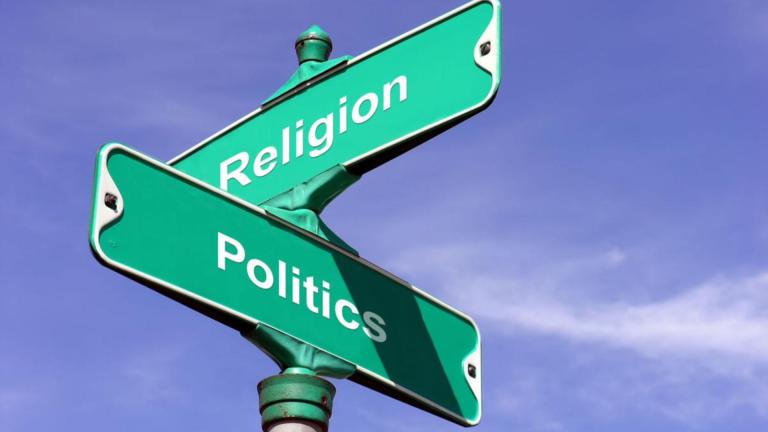
This week Determinetruth will begin a series of livestream events over the next 8 months to discuss the Church and politics. In this series, we will address a wide variety of issues. My conviction is that Jesus’ kingdom radically undermines the whole system.
Yep, Jesus was neither a Democrat nor a Republican. Now, I am confident that I could say this in most churches or Christian communities and find little/no objections.
The irony is that most American Christians’ understanding of Jesus actually corresponds quite well to their political convictions. That is, I suspect that many Christians believe that Jesus would vote the way they do. After all, wasn’t that the aim of the Moral Majority? Wasn’t the goal of the Moral Majority’s voter’s guides (which my wife and I relied on heavily 30 years ago) to help Christians know the correct persons and issues to vote for—i.e., to help us know how Jesus would vote?
Truth is on our side
The political world that we live in, which is largely shaped by the media, which are themselves owned by major corporations, wants us to believe that the truth is on their side—It doesn’t matter if that side is the right or the left. The way it often works is that each side presents their views from the perspective that, “We have what is right/true and what is best for everyone.” This usually takes the form of, “They [the other side] spew only lies and promote only what suits them.”
The problem is that everyone does this. And we consume it. We not only consume it, we have become dependent on it. It is like a drug and we are the users/addicts. We have been influenced by the rhetoric so deeply that we have trouble believing anyone else—even Jesus.
So what is the solution? Well, before I tell you my thoughts (Jesus—Jesus is the answer. Sorry, I just had to sneak it in—kinda like a child peaking at their Christmas presents before everyone else wakes up; not that I ever did that—I’ve only heard that this happens in some homes), I think it is important to note that we have been so conditioned by our surroundings that we have trouble listening to anything else.
The only solution for the Church (I prefer people of God—as you may well know by now) is to get back to Jesus. But here is the problem. We don’t actually want to do that. Now, of course, we do, but we don’t.
What I mean is this: We want to get back to Jesus. But the Jesus we want to get back to is the one that corresponds with the Jesus that fits into my popular understanding of right and wrong; good and bad. But this popular understanding of right and wrong is itself the result of all the influences that have come to inundate our society. Sadly, we Christians often believe that we are exempt from popular propaganda.
Conspiracy theories
I hate conspiracy theories. The problem with conspiracy theories is that they give conspiracy theories a bad name. But what if Jesus was promoting a conspiracy theory (maybe not in the way that you and I think of conspiracy theories)? Not in the bad sense, but in the good sense (is there a “good” sense to conspiracy theories?).
The execution of Jesus fits the mold of a conspiracy theory well. After all, didn’t those in power use their power to suppress Jesus and ultimately have him killed? This is tantamount to saying that Jesus’ teachings were subversive and meant to undermine the establishment—which they were as far as I can tell. This is what I mean by a conspiracy theory.
The Romans killed Jesus for treason; even though He stated explicitly to the Roman Governor that His “Kingdom is not of this world” (John 18:36)—which does not mean what many Christians have come to think it means. Jesus meant that His kingdom was not like the kingdoms of the world. He didn’t mean that it has nothing to do with this world.
Nonetheless, you can imagine the Roman media coverage (Fox News; CNBC—go whichever way you want with this one). They would have reported on Jesus’ claims to be a king and they would have neglected to share that He seemingly posed no imminent threat to Rome. Anyone tuning in to the major broadcasts on Roman television (be they in Greece or Spain) would have sympathized with the Roman Empire’s need to have Jesus executed.
Similarly, the religious elite in Jerusalem handed Jesus over to be crucified because He spoke blasphemy (Mark 14:64)—though this accusation makes some sense; Jesus really did blaspheme, well at least in their minds He did. Jesus, of course, didn’t blaspheme because what He said was the truth. But that is my point. Those in power, in this case, the religious elites in Jerusalem, were not about to consider the possibility that Jesus was speaking the truth because Jesus was a threat to their power.
NB: We too often think that the dispute between Jesus and religious leaders in Jerusalem was merely a matter of the proper interpretation of the Torah—it was a religious dispute. And this may be true to a lesser extent. The real conflict, however, was over power. The religious leaders—well, at least those who adhered to the Pharisaical party—were looking for a Messiah. They wanted a messiah. They despised Roman rule. Why, then, didn’t they accept Jesus? Because Jesus’ messianic claims served to undermine their wealth and power. He wasn’t the kind of Messiah they wanted.
You see, we may want to think that the conflict between Jesus and the Pharisees (the Sadducees are a whole other thing to deal with) was primarily about Jesus’ identity. That is what the Pharisees wanted everyone to think. And you can be sure that this is the message they told everyone through their media outlets (imagine their versions of Time Magazine and CNN).
But this was just a cover-up for the real issue. Jesus was teaching and preaching a Gospel of the kingdom that promoted the values of God’s kingdom. And these values undermined the Pharisees and their power.
The Church, Politics, and the Kingdom today
When it comes to the Church, politics, and the kingdom today, it is my conviction that the only place to begin is with a firm understanding of Jesus and His proclamation of the Kingdom. Now, I suspect that you might all agree with this point—especially if you are reading this post, which is a sure indication of your spiritual maturity.
The problem is not going to be in my assertion that Christians who live in a democracy (or any form of government for that matter) must advocate for the principles of the Kingdom of God. I suspect that every Christian will agree with this. In fact, I am confident that we could assemble a large gathering of Christians to attend a seminar on “The Church and politics”; even if we advertised that our message was going to center on “Jesus and the Kingdom.”
The problem, in my estimation, is two-fold.
First, I suspect that most Christians have a very poor understanding of the Kingdom of God. For many, the Kingdom of God is spiritual, heavenly, and other-worldly. As such, the Kingdom of God has little to do with political life in the here and now.
Second (and this is the heart of the matter), many Christians, myself included, don’t really want to embrace Jesus’ kingdom ethics. What do I mean?
Back to the opening
This goes back to what I said at the beginning of this post.
First, we have come to believe that our side [the right or the left] has what is true/right and what is best for everyone. And, as Christians, we have learned to read Jesus and the Kingdom in light of these convictions. We have tamed Jesus and made Him fit into our box. I’m sure there is plenty of resistance to this assertion.
Second, many of us are in positions quite similar to the Romans and the Pharisees; namely, we have power and wealth—a lot more than we realize. Now, don’t get me wrong. I am not suggesting that we don’t love Jesus. I am suggesting that we have made Jesus into a good American _________ (fill in the blank here with your preferred political party).
You see, I suspect that if someone were to lay out the teachings of Jesus—which were radical, to say the least—we would easily find modern categories to define them: e.g., those on the right would label them, “communist, socialist, democratic, liberal.” The purpose of these categories would be to dismiss this understanding of Jesus as a misrepresentation of what He taught.
Some would say:
“Surely, Jesus believed that industry and self-effort are the keys to success and He believed that the best way to care for the poor is to support big businesses that will themselves aim for more profit by expanding the labor base, thus providing the poor with jobs—Jesus was most certainly a Republican.”
Others would say:
“Surely, Jesus believed that the rich are greedy sinners who desire nothing but personal gain and He believed that the best way to love our neighbors is to tax the wealthy so that government can provide the necessary resources to care for the poor—Jesus was most certainly a Democrat.”
What happens when someone comes along and says that Jesus was talking about a radically different sort of kingdom; a kingdom predicated on self-denial and love for our neighbors; a kingdom predicated on peace and justice? I suspect that most Christians would either spiritualize His teachings and, as a result, their political convictions would remain relatively unaffected; or they would modify their understanding of Jesus’ teachings so that they correspond to their political convictions. Either way, their political convictions remain unchanged.
Few, however, would realize that those in power (be they Democrats or Republicans) embody the very institutions and power structures that Jesus was speaking against.
To follow the upcoming livestream series go to the Determinetruth YouTube page and “Subscribe.” Then you will be automatically notified of upcoming events. Of course, if you are reading this post sometime after it originally posted, all of the videos will be present on the Determinetruth YouTube page.
Our goal is to keep these posts free of charge. I do not intend to ever hide them behind a paywall. I can only do this if those of you who have been blessed by them and can afford to give ($5, $10, $25, or more/month) do so. You can give a tax-deductible contribution by following this link.
Please share this post and let others know about determinetruth.
If you wish to view this blog on your smartphone through the Determinetruth app simply download the “tithe.ly church” app on your smartphone and insert “determinetruth” as the church name you wish to follow. Once it is loaded, simply click on the “blog” icon and it will automatically load.
If you would like to have Rob speak at your church or organization in person or via Zoom, please let us know by filling out the contact info on the Contact me tab on this site.
















